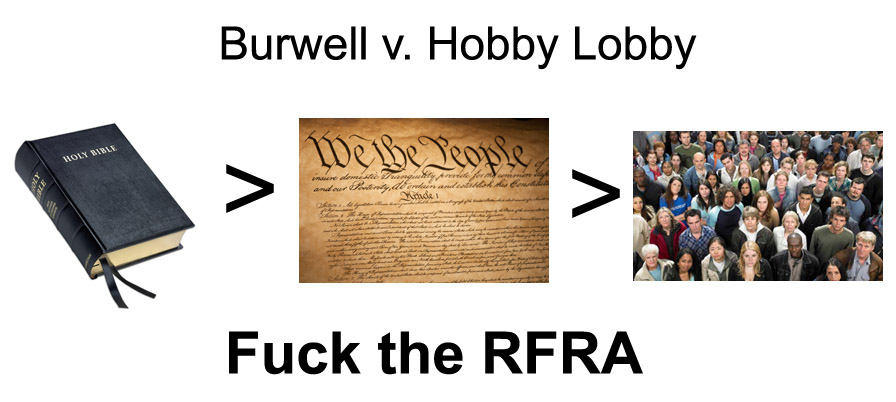Burwell v. Hobby Lobby: Fuck the RFRA
To permit this would be to make the professed doctrines of religious belief superior to the law of the land, and, in effect, to permit every citizen to become a law unto himself. Government could exist only in name under such circumstances.
The rule respondents favor would open the prospect of constitutionally required religious exemptions from civic obligations of almost every conceivable kind -- ranging from compulsory military service, to the payment of taxes, to health and safety regulation such as manslaughter and child neglect laws, compulsory vaccination laws, drug laws, and traffic laws, to social welfare legislation such as minimum wage laws, child labor laws, animal cruelty laws, environmental protection laws, and laws providing for equality of opportunity for the races. The First Amendment's protection of religious liberty does not require this.
But to say that a nondiscriminatory religious practice exemption is permitted, or even that it is desirable, is not to say that it is constitutionally required, and that the appropriate occasions for its creation can be discerned by the courts. It may fairly be said that leaving accommodation to the political process will place at a relative disadvantage those religious practices that are not widely engaged in; but that unavoidable consequence of democratic government must be preferred to a system in which each conscience is a law unto itself or in which judges weigh the social importance of all laws against the centrality of all religious beliefs.
- The purposes of this Act are
(1) to restore the compelling interest test as set forth in Federal court cases before Employment Division of Oregon v. Smith and to guarantee its application in all cases where free exercise of religion is substantially burdened; and
(2) to provide a claim or defense to persons whose religious exercise is substantially burdened by government.
(b) EXCEPTION. -- Government may burden a person's exercise of religion only if it demonstrates that application of the burden to the person --
(1) furthers a compelling governmental interest; and
(2) is the least restrictive means of furthering that compelling governmental interest.
(c) The Court assumes that the interest in guaranteeing cost-free access to the four challenged contraceptive methods is a compelling governmental interest, but the Government has failed to show that the contraceptive mandate is the least restrictive means of furthering that interest. Pp. 38–49.
When people believe X, they're going to try to actualize X. No matter how wrongheaded that X may be.
Where does this leave us?
To permit this would be to make the professed doctrines of religious belief superior to the law of the land, and, in effect, to permit every citizen to become a law unto himself. Government could exist only in name under such circumstances.


